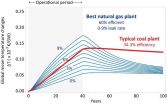INFORMATION:
Other participants in this research include Roselyne Alphonce and Frode Alfnes, School of Economics and Business, Norwegian University of Life Sciences.
The US Department of Agriculture's Hazard Analysis and Critical Control Points program funded this research.
Voters more inclined than consumers to pay for food safety
2014-12-08
(Press-News.org) Voters are more willing to pay for a decreased risk of food-related illness than consumers, but female consumers are more willing to pay than male consumers, according to an international team of researchers.
"The question is, what would consumers prefer?" said Amit Sharma, associate professor of hospitality management and finance, Penn State. "Would they prefer a market-driven, or a policy-driven approach? Either of those two approaches could lead to some price increase. Improving quality costs money, and food safety is no different."
Sharma and colleagues wanted to know whether people would pay more for a lowered risk of a food-related illness, and in particular whether their choices would vary if they were thinking about the issue from a consumer perspective as opposed to a voter perspective.
"The question is whether it matters whether we elicit consumer or citizen preferences when valuating food safety," said the researchers in a recent issue of Food Policy.
The researchers created two surveys for distribution to participants. One survey asked about the participant's willingness to pay more at a neighborhood restaurant to ensure reduced risk of food-related illness. The other asked whether the participant would vote yes or no for regulations to reduce this risk that would result in the same increase in restaurant prices. Participants were asked about their willingness to pay increased amounts -- from none, to 1 to 5 percent, to over 30 percent of the meal price -- for a lowered risk of food-related illness. Respondents answered the survey for a 25 percent, 50 percent, and 75 percent reduction in risk.
Over the course of a semester, the team collected survey responses from 864 people at a university campus restaurant. Participants covered a range of ages, income levels and educations levels and included local residents, students and university employees.
The researchers also developed models, taking into account variables including participant gender and age, to determine whether the participants responded to the survey differently as consumers than as voters.
The researchers found that, in the total sample, voters and consumers varied significantly in their willingness to pay for decreased risk. Furthermore, among consumers, women were more willing than men to pay for a reduced risk of illness, and in particular, older women were willing to pay more than young men.
"This indicates that while men and women have a similar (willingness to pay) for a reduction in the foodborne risk level at a society level, women are more willing than men to pay to protect themselves when at a restaurant," the researchers said.
Neither voters nor consumers differed in their willingness to pay at different risk levels. However, the overall difference between responses in a voting context, as opposed to as consumers, reflects participants' varying reactions to the cause of a price increase, said Sharma.
"An increase in price because of a policy, or an increase in price because of a vote that led to a government policy, would be more acceptable than if the restaurants had implemented this by themselves," said Sharma.
This is important if policy decisions rely on consumer-based data that may not accurately convey people's willingness to pay more for a reduced food-related risk.
"We might come to undervalue what citizens would truly pay for safer foods versus if this was more of a market driven or in this case a buying scenario," said Sharma. "If this was driven by policy, then it's likely that citizens would be willing to pay a higher price."
ELSE PRESS RELEASES FROM THIS DATE:
Animal research sheds light on harmful mood disorders in new mothers
2014-12-08
In the days shortly after giving birth, most mothers experience a period of increased calmness and decreased stress responses, but around 20% of mothers experience anxiety. Some women may become depressed, and around one in a thousand can develop psychosis. The latest evidence indicates that these distressing responses to motherhood are still poorly understood, but that animal research could provide valuable clues to their causes.
Writing in the British Journal of Pharmacology, Dr David Slattery and Dr Clara Perani highlight that anxiety, depression and psychosis during ...
Wind farms to do not affect property values, study finds
2014-12-08
Wind turbine developments have no effect on property values of nearby homes and farms, according to new research from the University of Guelph.
Published in a recent issue of the Canadian Journal of Agricultural Economics, the study is believed the first peer-reviewed study on this issue in Canada.
It was conducted by Richard Vyn, a professor in the Department of Food, Agricultural and Resource Economics, and Ryan McCullough, a former U of G graduate student and now a policy analyst for Health Canada.
They analyzed more than 7,000 home and farm sales in Melancthon ...
Bougainvillea's response to deficit irrigation tested
2014-12-08
PORTICI, ITALY - As water becomes scarcer in arid and semiarid regions across the globe, the floriculture industry is looking for ways to reduce water usage and produce ornamental plants more efficiently. Chiara Cirillo and members of an Italian research team coordinated by Professor Stefania De Pascale, say that understanding flowering plants' response to water management is critical for optimizing the production of high-quality potted ornamentals. "Water-saving irrigation management strategies are among the options available to horticultural growers to reduce water consumption ...
New model helps boost fishery profits and sustainability
2014-12-08
DURHAM, N.C. -- By identifying the most efficient fishing practices and behaviors, a new model developed by economists at Duke University and the University of Connecticut could help fishermen land larger paychecks while reducing the risk of fishery depletion.
"We're not talking about a trivial improvement. In some cases, we found that identifying the most efficient practices led to a 20 percent annual increase in total revenues if the fishery is managed differently," said Martin D. Smith, professor of environmental economics at Duke's Nicholas School of the Environment.
"Under ...
Solid-state proteins maximize the intensity of fluorescent-protein-based lasers
2014-12-08
The same research team that developed the first laser based on a living cell has shown that use of fluorescent proteins in a solid form rather than in solution greatly increases the intensity of light produced, an accomplishment that takes advantage of natural protein structures surrounding the light-emitting portions of the protein molecules. The findings from investigators Seok Hyun Yun, PhD, of the Wellman Center for Photomedicine at Massachusetts General Hospital and Malte Gather, PhD, of the University of St. Andrews in the U.K. appear in the online journal Nature ...
Chesapeake Bay region streams are warming
2014-12-08
CHARLOTTESVILLE, Va. -- The majority of streams in the Chesapeake Bay region are warming, and that increase appears to be driven largely by rising air temperatures. These findings are based on new U.S. Geological Survey research published in the journal Climatic Change.
Researchers found an overall warming trend in air temperature of 0.023 C (0.041 F) per year, and in water temperature of 0.028 C (0.050 F) per year over 51 years. This means that air temperature has risen 1.1 C (1.98 F), and water temperature has risen 1.4 C (2.52 F) between 1960 and 2010 in the Chesapeake ...
Office jerks beware - your good ideas may not always be welcomed by colleagues
2014-12-08
You don't have to be a jerk to come up with fresh and original ideas, but sometimes being disagreeable is just what's needed to sell your brainchild successfully to others. However, difficult or irritating people should be aware of the social context in which they are presenting their ideas. A pushy strategy will not always be equally successful, warn Samuel Hunter of Pennsylvania State University and Lily Cushenbery of Stony Brook University in the US, in an article in Springer's Journal of Business and Psychology.
People are often labelled as jerks if they are disagreeable ...
Is natural gas a 'bridge' to a hotter future?
2014-12-08
Washington, D.C.-- Natural gas power plants produce substantial amounts of gases that lead to global warming. Replacing old coal-fired power plants with new natural gas plants could cause climate damage to increase over the next decades, unless their methane leakage rates are very low and the new power plants are very efficient.
These are the principal findings of new research from Carnegie's Ken Caldeira and Xiaochun Zhang, and Nathan Myhrvold of Intellectual Ventures that compares the temperature increases caused by different kinds of coal and natural gas power plants. ...
High level engagement in comment sections can curb internet trolling
2014-12-08
Washington, DC (December 8, 2014) - Scrolling through the comments section on a news site is like seeing a verbal war before your eyes. Internet trolls flourish in an anonymous world, so much so that sites like Reuters and Popular Science have done away with the comment sections altogether. But there has to be a better way to let the audience engage in a civil manner. A recent study published in the Journal of Computer-Mediated Communication by researchers at the University of Texas, Purdue University, and University of Wyoming, found that having a journalist engage with ...
Genes that cause pancreatic cancer identified by new tool
2014-12-08
A technique that can identify causes of cancer invisible to genetic sequencing has uncovered large sets of previously unknown pancreatic cancer genes. It is hoped that this study will boost research into a disease that is still poorly understood and for which five-year survival rates have stood at around 5 per cent for the past four decades.
The technique works by introducing sections of DNA called piggyBac transposons into the mouse genome. Transposons jump around within the genome, reinserting themselves at random and causing a different mutation in each cell of the ...



